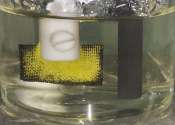Experts warn against hype for deriving green hydrogen from direct seawater electrolysis
At first glance, the plan sounds compelling: invent and develop future electrolyzers capable of producing hydrogen directly from unpurified seawater. But a closer look reveals that such direct seawater electrolyzers would ...
22 hours ago
0
52









